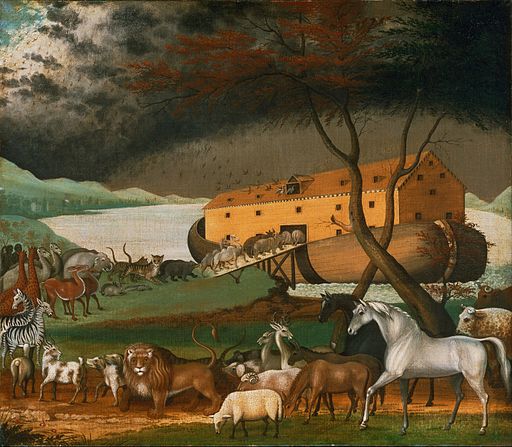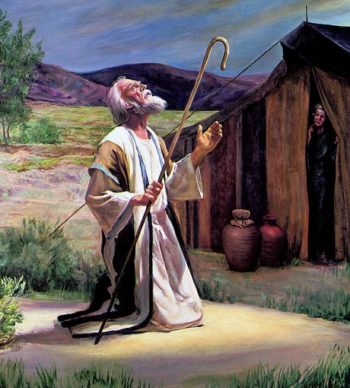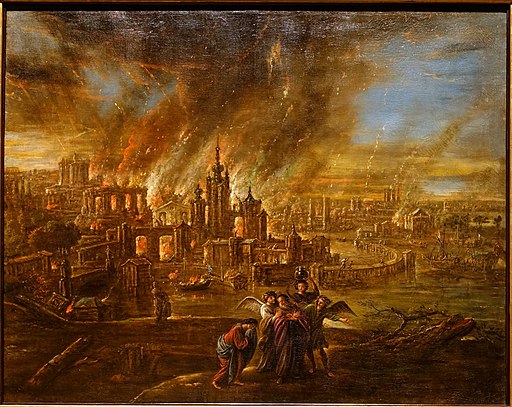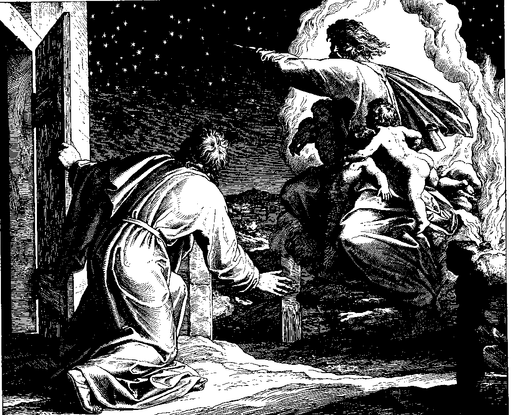We frequently study the events, teachings and stories in the scriptures in a vacuum, giving little thought to what came before or what follows afterward. While we may appreciate the need to read a given passage in its proper historical and cultural context, we often fail to ask the question: is there something more I can learn about this narrative, parable or miracle by comparing it with what I just read or what comes later? A good illustration of what we gain by pursuing this line of inquiry can be seen when we contrast how two Old Testament Patriarchs—Noah and Abraham—interacted with the divine on certain occasions during their lives.
Noah
Unlike many Christian denominations, Noah is revered as an important prophet in Mormonism. This is due, in part, to Joseph Smith’s reimagined portrayal of the man in the Pearl of Great Price.[1] But the authors of Genesis paint a more complex, and arguably less-flattering, picture of this Old Testament figure.
To begin with, as his descendants are about to be introduced, we are told Noah was “a righteous man; … blameless in his age.”[2] The qualifier at the end is ambiguous, and can be read as damning with faint praise. As noted by the esteemed 11th-century Talmudic scholar, Rashi, this verse invites a relative comparison of Noah’s worthiness with the pervasive wickedness of the world in which he lived.[3] In other words, when measured against everyone else, the man was pretty righteous. Even if we read the verse more charitably, it still implies that Noah never fully lived up to his potential. “Blameless” is not synonymous with “greatness.”[4]
This interpretation finds support in the blessing pronounced by Lemech, Noah’s father, at the time of his birth: “Out of the ground that the Lord has cursed, this one shall bring us relief from our work and from the toil of our hands.”[5] But Lemech’s hopes are not realized; his son proves incapable of alleviating the suffering mankind has experienced since its expulsion from the Garden of Eden.

At the end of the day, Noah’s biggest accomplishment was saving himself, his family, and some animals from a flood. And we are left wondering: wasn’t there something more he could have done? Why didn’t he, for example, intercede on behalf of his neighbors and countrymen? Why didn’t he ask the Lord to give the people another chance? Weren’t there at least a handful of semi-righteous people who deserved a spot on the boat, even if only in steerage? Are we to believe there were no other souls worth saving?
The fact that God gave him ample warning of his plans arguably implies that he was inviting Noah to plead the case of his brothers and sisters. Perhaps the Lord would have denied his request, but if he had at least tried, Noah could have demonstrated that he was something more than just “blameless.”
His actions after the flood suggest he belatedly came to realize he had missed a critical opportunity, an omission that left him haunted by his own survival and his failure to defend his people. After exiting the ark and renewing his covenant with the Lord, we are told he “began to plant a vineyard. He drank of the wine and became drunk, and he uncovered himself within his tent,” exposing himself in the presence of his children.[6]
The writers have condensed a process—planting grape vines, harvesting a crop, and producing wine—that typically takes 3-5 years in order to make a point: Noah wanted to escape, in the words of the biblical scholar Judith Klitsner, “his unbearable reality, to simulate death by living in self-induced unconsciousness.” And his actual death, though occurring hundreds of years later, is recorded immediately thereafter: “Noah lived after the Flood 350 years. And all the days of Noah came to 950 years; then he died.”[7] The end.
Abraham
Abraham, like Noah, confronted the specter of the wholesale destruction of his world. Yet Abraham’s response differs markedly from that of his predecessor.
Once God apprised him of what was in store for Sodom and Gomorrah, Abraham makes a fervent and sustained plea on behalf of the cities’ residents, which included his nephew, Lot, and his family. He boldly begins with an accusatory question: “Will you indeed sweep away the righteous with the wicked?”[8] And just in case he wasn’t making himself clear, two verses later he declares: “Shall not the Judge of all the earth do what is just?”[9] This guy clearly had some chutzpah.

Abraham then begins to bargain with God, hypothetically asking six times: “suppose there are a “X” number of righteous people who are worthy of preservation, will you destroy them, too, or would their deaths simply be collateral damage?” Each time the Lord concedes his point, ultimately agreeing that annihilation would not be just even if there were only ten souls who deserve to be rescued.
Their exchange then concludes abruptly: “And the Lord went his way, when he had finished speaking to Abraham.” God simply said, “We’re done here.” Abraham had worn him down!
Next, angels are dispatched to Lot and his family who encourage him, first, to round up any friends and family members in Sodom he wishes to save, and second, to exit the city immediately before it is destroyed. Which Lot does.
By his actions, Abraham displayed his tremendous faith in the power of redemption, the ability of even the worst of us to change. He also exhibited an acute understanding of the obligation each of us owes to our fellowman, one born of the knowledge that no one can be saved alone. In this instance, he fulfilled that duty by engaging in a provocative—and inherently risky—confrontation with God.
In case we miss the obvious thematic similarities between these two stories, the authors employ a number of literary devices to link them. As Judith Klitsner notes, God “rained [m-t-r] upon Sodom and Gomorrah brimstone and fire … from the heavens”[10] just as he sent “rain on the earth for forty days and forty nights….”[11]Both stories also use the verb sh-h-t, meaning, “to destroy.” And “Noah uses gopher (gofer) wood to build the ark while God rains down the phonetically similar gofrit vamelah, sulphurous fire on Sodom.”[12] The Hebrew scribes loved puns. Really, they did.

Notwithstanding the numerous links and parallels between these two tales, the behavior of the individual protagonists differs radically. Indeed, they are polar opposites. Abraham vigorously protested God’s proposed course of action while Noah passively does what he is told:
Then the Lord said to Noah, “Go into the ark, you and all your household, … For in seven days’ time I will make it rain on the earth for forty days and forty nights, and I will blot out from the earth all existence that I created.” And Noah did just as the Lord commanded him.
Gen. 7:1, 4-5. (NJPS Tanakh translation).
Noah never contemplated an alternate reality, never considered saying to the Lord, “Suppose I know of 50 individuals who are worthy of thy grace…?” Instead, he accepts what God has proposed as inevitable. Indeed, Noah’s sole focus was on his own survival while that of Abraham was on his earthly mission. Abraham never forgot that he was the man who had covenanted with God—not only on his own behalf, but also as a proxy for all of his posterity.

These stories force us to wrestle with difficult questions. At what point does faithfully following God’s commands devolve into blind obedience? How do we choose to relate to God: as passive, pre-programmed automatons or as free agents, genuine disciples who are willing to share the burdens and sorrows of our fellowman? And do we have the courage to stand up for what we believe is right even when doing so may contravene the letter of the law or the dictates of ecclesiastical authority? These are not easy questions, nor were they meant to be.
[1] Moses 8:8-30. When reading Joseph Smith’s retelling of certain episodes from the lives of the early Old Testament patriarchs, there are four things we should bear in mind.
First, he was not making a new translation of an ancient text. Indeed, the vast majority of Mormon scholars believe Joseph never “translated” anything in the conventional sense for the simple reason that he lacked the training and facility with foreign languages to do so.
Second, as Terryl Givens notes, when Joseph encountered troubling episodes in the scriptures—especially the Old Testament—he simply rewrote the text. He made no pretense of retranslating or editing the original text. Givens, Terryl, with Brian M. Hauglid. The Pearl of Greatest Price, Oxford, 2019, p. 70.
Third, Smith’s translation of the Bible has never been canonized by the church, with the exception of what is included in the Pearl of Great Price. Also, several of his textual revisions are inaccurate, probably because he didn’t always understand what he was reading. These were mistakes he likely would not have made had he lived in our time when great discoveries in archeology and advances in biblical scholarship have deepened our understanding of the Bible.
Finally, what appears in the Pearl of Great Price does not displace, nor is it superior to, what is found in the Old Testament. Joseph’s theological objectives in writing that book were radically different from those of the authors of the Old Testament.
[2] Genesis 6:9 (NJPS Tanakh translation; emphasis added).
[3] Leibowitz, Nehama. Studies in Bereshit. The World Zionist Organization Department of Torah Education in the Diaspora, 2010, p. 63.
[4] Klitsner, Judy. Subversive Sequels in the Bible. Maggid Books, Jerusalem, 2009, p. 3.
[5] Genesis 5:29 (NRSV).
[6] Gen. 9:20-21 (NJPS Tanakh translation).
[7] Gen. 9:28-29 (NJPS Tanakh translation).
[8] Gen. 18:25 (NJPS Tanakh translation).
[9] Gen. 18:25 (NJPS Tanakh translation).
[10] Gen. 19:24 (NJPS Tanakh translation).
[11] Gen. 7:4 (NJPS Tanakh translation).
[12] Subversive Sequels, pp. 6-7.

If you believe the events of the world are pre-ordained (not pre-determined) but pre-ordained, then we are, I believe living a canvas that has already been painted. Therefore I hesitate to speculate what Noah might or might not have done. It seems to me that this was the time for the “baptism” of the earth and Noah, while an important part of it, was not the driving force and neither could he have been such. That he was human, and no doubt regretted the demise of his fellow men and the state of the world that continued to have both good and evil even after the baptismal flood cannot be doubted.
When the time comes for the earth to be cleansed with fire, I wonder if the leaders and Profits on the earth will be able to postpone the time through any of their actions.
I also wonder if at times we can postpone someone’s death by prayer and fasting? When my father was in the hospital suffering from pancreatic cancer the morning of his death my mother and I changed our prayers to let him go if this was his time to leave. He died 10 minutes later. Prior to that time we had been begging the Lord to spare him.
Just some thoughts.
Karen
Prophets